|
|
|
Sort Order |
|
|
|
Items / Page
|
|
|
|
|
|
|
| Srl | Item |
| 1 |
ID:
100708
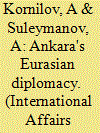

|
|
|
|
|
| Publication |
2010.
|
| Summary/Abstract |
LOCATED PARTLY IN EUROPE and partly in Asia - in two most important and problem-ridden regions of the world, Turkey is following an uncommonly proactive and ambitious foreign policy. On the one hand. Turkish diplomacy is engaged in dialogue to resolve problems with its close neighbors. On the other, Ankara is trying to establish a "belt of peace" around it by mediating in resolving important regional issues, such as Iran's nuclear program, the Nagorno-Karabakh conflict and the Arab-Israeli confrontation.
|
|
|
|
|
|
|
|
|
|
|
|
|
|
|
|
| 2 |
ID:
160854
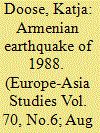

|
|
|
|
|
| Summary/Abstract |
Natural disasters can sometimes have a tremendous impact on societies and can even contribute to the outbreak of violent conflicts. The onset of the Nagorno-Karabakh conflict is usually attributed to the lack of Soviet control over the periphery and the consequent ‘resurgence of ethnicity’. Based on an analysis of how the main political actors in Moscow and the Caucasus framed the 1988 earthquake in Armenia in opposition to each other, this essay shifts the focus from political history to environmental history to argue that the disaster, and the narratives revolving around its origin and meaning, can further explain the exacerbation of the conflict.
|
|
|
|
|
|
|
|
|
|
|
|
|
|
|
|
| 3 |
ID:
127598
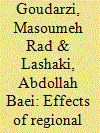

|
|
|
|
|
| Publication |
2013.
|
| Summary/Abstract |
Iran and Azerbaijan are key countries in the Caspian Basin thanks to their historical continuity, religious and cultural similarities, shared energy resources, and strategic position. However, since Azerbaijan gained its independence, complex and contradictory interactions have been shaping their relations and influencing the region's dynamics. At the initial stage, their relations were affected by political and ideological differences, as well as the sharp increase in the geopolitical importance of the Caucasus and the Caspian Basin in past two decades. Nor could the role of external factors be ignored. The formation of new borders and political blocs, as well as access to energy resources have made the region a focal point in world geopolitics and provided grounds for the intervention of regional and transregional powers aiming to attain their security, as well as their political and economic interests.
This study examines security, as well as the political and economic factors at the internal and external levels that have contributed to escalation of the conflicts between Iran and Azerbaijan in the past two decades.
|
|
|
|
|
|
|
|
|
|
|
|
|
|
|
|
| 4 |
ID:
088531
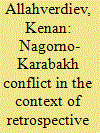

|
|
|
|
|
| Publication |
2009.
|
| Summary/Abstract |
Why Karabakh? Why has this small patch of land been a bone of contention in the Caucasus for so long (since the 19th century)?
The answers, not infrequently placed in political and ethnic contexts, are numerous:
Historical memory of the various Caucasian nationalities about alleged ethnic insults;
Antagonistic ethnopolitical contradictions due to the absence of ethnic complementariness among the main local ethnic groups;
The clash between two major postulates of international law: the territorial integrity of states and the right of nations to self-determination;
Territorial claims that develop into aggression;
The geopolitically conditioned continuous conflict caused by the neo-imperial intentions of the main players on the world political scene;
|
|
|
|
|
|
|
|
|
|
|
|
|
|
|
|
| 5 |
ID:
115927
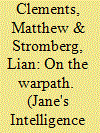

|
|
|
| 6 |
ID:
108069


|
|
|
|
|
| Publication |
2011.
|
| Summary/Abstract |
This article attempts to analyse the political discourse of some of the Azerbaijani elite on the Nagorno-Karabakh conflict through the lens of the views of leading members of Azerbaijani society. The information is based on personal interviews conducted with some influential members of the Azerbaijani political society in Baku in December 2001 and April 2009. The focus of the study was to analyse how Azerbaijanis (re)construct their ideas about Armenian identity and community. The Azerbaijani narration of the Nagorno-Karabakh conflict reveals how they have isolated themselves from their neighbours and from Western powers and how they legitimise their isolation.
|
|
|
|
|
|
|
|
|
|
|
|
|
|
|
|
| 7 |
ID:
151985


|
|
|
|
|
| Summary/Abstract |
TUCKED IN the borderland between Europe and Asia sits a nation-state recognized by seven American states, New South Wales, the Basque parliament, Abkhazia, Ossetia and Transnistria, but by no country—its chief financier and defender, Armenia, included. Six hours’ drive southeast of Yerevan, you reach it through a series of dry ochre canyons that give way to rolling green steppe. At the immense skyline of the Lesser Caucasus, you cross a passport control governing no official border and a time-zone change that goes unacknowledged. You drive up the most expensive strip of pavement in Transcaucasia, joining a winding trickle of minibuses and T-72 tanks chained to the beds of semitrucks. Between mountaintops stretch nets raised to ensnare attacking helicopters. Billboards claim that the crimes of 1915 may yet be avenged. A giant statue of a grandfather and grandmother hewn out of volcanic tufa is captioned with the motto of the republic: “We Are Our Mountains.” Descending into Stepanakert, the capital, you check in with authorities and observe the trappings of statehood—parliament, police force, postal system—developed over more than two decades of sitting within Grad rocket range of Azerbaijani forces, which make regular claims that they can capture Stepanakert in four days and threaten to shoot down any planes, commercial or military, that attempt to use its airport.
|
|
|
|
|
|
|
|
|
|
|
|
|
|
|
|
| 8 |
ID:
112969


|
|
|
|
|
| Publication |
2012.
|
| Summary/Abstract |
The main and only goal of conventional deterrence, used by the Armenian parties, and political containment, owed largely to the positions of the international community and influential external actors, is to maintain stability and fragile peace in the zone of the Nagorno-Karabakh conflict.
|
|
|
|
|
|
|
|
|
|
|
|
|
|
|
|
| 9 |
ID:
116310
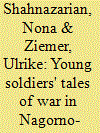

|
|
|
|
|
| Publication |
2012.
|
| Summary/Abstract |
The active participation of children and young men in armed conflicts has not lost its significance as a global phenomenon in the twenty-first century. In Eurasia, where numerous regions are plagued by violent conflicts, many of the everyday realities these young soldiers experienced still remain unclear and continue to be under-researched. Through the use of biographical interviews, this essay retrospectively explores the ways in which war in Nagorno-Karabakh impinged on male teenagers' identities. A biographical approach not only reveals these former young soldiers' experiences which may have otherwise never been told but also allows them to reflect on their war experiences more than ten years later. In this way, we aim to complement existing research on the Nagorno-Karabakh conflict with new insights.
|
|
|
|
|
|
|
|
|
|
|
|
|
|
|
|
|
|
|
|
|